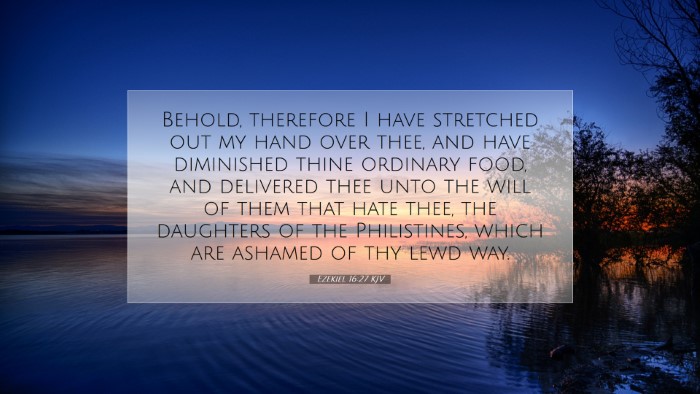Ezekiel 16:27 - Commentary
Bible Verse: Ezekiel 16:27 – "Behold, therefore I have stretched out my hand over thee, and have diminished thine ordinary food, and delivered thee unto the will of them that hate thee, the daughters of the Philistines, which are ashamed of thy lewd way."
Contextual Overview
The book of Ezekiel is a prophetic text authored by the prophet Ezekiel during the Babylonian exile, addressing the people of Israel. Chapter 16 is particularly poignant as it uses the metaphor of an unfaithful wife to depict Israel's infidelity to God. In this particular verse, God reveals the dire consequences of Israel's spiritual adultery, emphasizing His judgment and the forsaking of His people to their enemies.
Theological Implications
This verse starkly illustrates the theological theme of divine judgment and the consequences of sin. As God stretches out His hand in judgment, it signifies a powerful image of His authority and sovereign will. The diminishing of ordinary food represents both physical and spiritual deprivation, a fate that is emblematic of those who turn away from God's statutes and embrace wickedness.
Insights from Matthew Henry
Matthew Henry provides profound insights into this passage, remarking on the provocative imagery of Israel's unfaithfulness. He notes that God's action of stretching out His hand is not merely punitive but also a reflection of His righteous anger against Israel's transgressions. Henry emphasizes that the phrase "delivered thee unto the will of them that hate thee" suggests a complete abandonment by God, where Israel finds herself in the hands of those who will exploit and shame her.
- Judgment: Henry underscores that this judgment is well-deserved due to Israel's persistent idolatry and betrayal.
- Contrast: He contrasts Israel's former privileged position as God's chosen people with her present disgrace among the nations.
- Application: The application he draws is relevant to the Church today; unfaithfulness can lead to severe consequences even amidst divine mercy.
Insights from Albert Barnes
Albert Barnes expands upon the imagery by examining the harsh reality of God’s abandonment: “the daughters of the Philistines, which are ashamed of thy lewd way.” His commentary suggests that even Israel's enemies could not comprehend her grievous sins, highlighting the depth of Israel's moral decline.
- Cultural Context: Barnes provides historical context regarding the Philistines, a people known for their animosity towards Israel, further exemplifying the shame that befalls God’s people.
- Spiritual Deprivation: He emphasizes that God diminishing ordinary food illustrates a withdrawal of divine favor, a critical aspect of the covenant relationship.
- Call to Repentance: Barnes insists that this passage serves as a profound call for repentance and an awareness of the seriousness of one's relationship with God.
Insights from Adam Clarke
Adam Clarke’s commentary sheds light on the nature of God’s dealings with His people. He posits that the cessation of ordinary food represents a removal of God’s provision, which could indicate a spiritual famine—an absence of the Word, the Spirit, and overall guidance. Clarke also notes the emphasis on shame, suggesting that the consequences of sin leave a mark not just in the physical realm but also deeply affects one's spiritual identity.
- Symbolism: Clarke interprets the 'food' symbolically, representing the spiritual nourishment that Israel has rejected.
- Mercy and Judgment: He emphasizes God's balance of mercy and judgment, stating that being handed over to one’s enemies serves a purpose of divine correction, despite its severity.
- Redemptive Potential: Clarke closes with the hopeful notion that God’s judgment, while harsh, carries the potential for redemptive outcomes through repentance.
Application for Today's Believers
For pastors, students, theologians, and scholars, Ezekiel 16:27 serves as a sobering reminder of the consequences of spiritual infidelity. This passage encourages careful introspection concerning one’s relationship with God and the importance of faithfulness. A few key applications include:
- Self-Examination: Just as Israel is called to account for her sins, believers are invited to examine their lives, asking where they may have strayed from faithfulness to God.
- Community Accountability: This calls for churches to practice accountability with one another, building a culture of support that resists the temptation to stray into idolatry of various forms.
- Hope and Restoration: Despite dire consequences, there remains a pathway to restoration through genuine repentance, which is essential for spiritual revival.
Conclusion
The profound insights from Matthew Henry, Albert Barnes, and Adam Clarke reveal that Ezekiel 16:27 is not just a condemnation of Israel but a timeless warning for all of God’s people regarding the spiritual consequences of unfaithfulness. It encapsulates themes of judgment, mercy, and the hope of restoration, serving as both a prophet’s lament and a call to faithfulness that reverberates through the ages.


